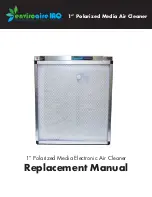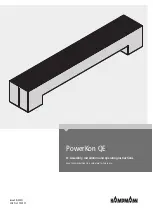
6 Installation
Installer reference guide
14
(A)RXP20~3 RXF20~35A2V1B
R32 split series
4P513661-2 – 2017.11
CAUTION
▪ Do NOT use mineral oil on flared part.
▪ Do NOT reuse piping from previous installations.
▪ NEVER install a drier to this R32 unit to guarantee its
lifetime. The drying material may dissolve and damage
the system.
CAUTION
▪ Use the flare nut fixed to the main unit.
▪ To prevent gas leakage, apply refrigeration oil only to
the inside of the flare. Use refrigeration oil for R32.
▪ Do NOT reuse joints.
NOTICE
Take the following precautions on refrigerant piping into
account:
▪ Avoid anything but the designated refrigerant to get
mixed into the refrigerant cycle (e.g. air).
▪ Only use R32 when adding refrigerant.
▪ Only use installation tools (e.g. manifold gauge set) that
are exclusively used for R32 installations to withstand
the pressure and to prevent foreign materials (e.g.
mineral oils and moisture) from mixing into the system.
▪ Install the piping so that the flare is NOT subjected to
mechanical stress.
▪ Protect the piping as described in the following table to
prevent dirt, liquid or dust from entering the piping.
▪ Use caution when passing copper tubes through walls
(see figure below).
Unit
Installation period
Protection method
Outdoor unit
>1 month
Pinch the pipe
<1 month
Pinch or tape the pipe
Indoor unit
Regardless of the
period
INFORMATION
Do NOT open the refrigerant stop valve before checking
the refrigerant piping. When you need to charge additional
refrigerant it is recommended to open the refrigerant stop
valve after charging.
WARNING
Connect the refrigerant piping securely before running the
compressor. If the refrigerant piping is NOT connected and
the stop valve is open when the compressor is run, air will
be sucked in. This will cause abnormal pressure in the
refrigeration cycle, which may result in equipment damage
and even injury.
6.4.3
Guidelines when connecting the
refrigerant piping
Take the following guidelines into account when connecting pipes:
▪ Coat the flare inner surface with ether oil or ester oil when
connecting a flare nut. Tighten 3 or 4 turns by hand, before
tightening firmly.
▪ ALWAYS use 2 wrenches together when loosening a flare nut.
▪ ALWAYS use a spanner and torque wrench together to tighten the
flare nut when connecting the piping. This to prevent nut cracking
and leaks.
a
b
c
d
a
Torque wrench
b
Spanner
c
Piping union
d
Flare nut
Piping size
(mm)
Tightening
torque (N•m)
Flare
dimensions (A)
(mm)
Flare shape
(mm)
Ø6.4
15~17
8.7~9.1
R=0.4~0.8
45° ±2
90°±2
A
Ø9.5
33~39
12.8~13.2
6.4.4
Pipe bending guidelines
Use a pipe bender for bending. All pipe bends should be as gentle
as possible (bending radius should be 30~40 mm or larger).
6.4.5
To flare the pipe end
CAUTION
▪ Incomplete flaring may cause refrigerant gas leakage.
▪ Do NOT re-use flares. Use new flares to prevent
refrigerant gas leakage.
▪ Use flare nuts that are included with the unit. Using
different flare nuts may cause refrigerant gas leakage.
1
Cut the pipe end with a pipe cutter.
2
Remove burrs with the cut surface facing down so that the
chips do NOT enter the pipe.
a
b
a
Cut exactly at right angles.
b
Remove burrs.
3
Remove the flare nut from the stop valve and put the flare nut
on the pipe.
4
Flare the pipe. Set exactly at the position as shown in the
following figure.
A
Flare tool for R32
(clutch type)
Conventional flare tool
Clutch type
(Ridgid-type)
Wing nut type
(Imperial-type)
A
0~0.5 mm
1.0~1.5 mm
1.5~2.0 mm
5
Check that the flaring is properly made.














































